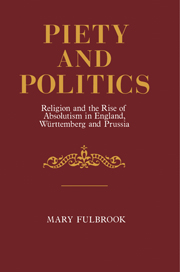Book contents
- Frontmatter
- Contents
- Preface
- 1 Introduction: cases and controversies
- 2 In pursuit of further reformation
- 3 State and society: the attempts at absolutism
- 4 The established church and toleration
- 5 From reform to revolution: Puritanism in England
- 6 From reform to retreat: Pietism in Württemberg
- 7 From reform to state religion: Pietism in Prussia
- 8 Conclusions and implications
- Bibliography
- Index
1 - Introduction: cases and controversies
Published online by Cambridge University Press: 09 January 2010
- Frontmatter
- Contents
- Preface
- 1 Introduction: cases and controversies
- 2 In pursuit of further reformation
- 3 State and society: the attempts at absolutism
- 4 The established church and toleration
- 5 From reform to revolution: Puritanism in England
- 6 From reform to retreat: Pietism in Württemberg
- 7 From reform to state religion: Pietism in Prussia
- 8 Conclusions and implications
- Bibliography
- Index
Summary
In seeking to understand the patterns of the past, we are frequently confronted with questions of religion. Men and women assess the inequities of this world in the light of transcendent standards, and strive to bring about a better society. Sometimes religious movements have seemed merely expressive of intolerable conditions: momentary outbursts of inefficacious revolt. Sometimes they have appeared to render the intolerable more bearable: to interpret present sufferings in ways which make it possible to continue living with them. And sometimes religious movements have appeared to act as autonomous creative forces, with a capacity to transform the nature of the societies in which they arose.
One such movement, which has been credited with a powerful role in the making of the ‘modern world’, is English Puritanism. In the century prior to the ‘Puritan Revolution’, a set of religious ideas and orientations arose which has been linked, in a variety of ways, with aspects of innovation in early modern Europe: with the beginnings of modern rational capitalism, science, democratic liberalism, individualism. This movement has been seen, in particular, as playing a crucial part in the overthrow of attempts at absolutist rule in England, thus laying the foundations of the parliamentary state in which capitalist and industrial development could flourish. Interpretations of the part played by Puritanism vary, from those allowing it an independent causal role, to those representing it as a dependent factor, reflecting more basic underlying socioeconomic conditions.
A movement inherently similar to Puritanism, considered in terms of its religious ethos and aspirations, arose also under conditions of attempted absolutist rule in certain continental European states.
- Type
- Chapter
- Information
- Piety and PoliticsReligion and the Rise of Absolutism in England, Wurttemberg and Prussia, pp. 1 - 18Publisher: Cambridge University PressPrint publication year: 1983



